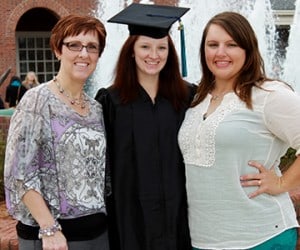
What inspired Ann Marie Nawn to become a Respiratory Therapist instructor and what keeps her there are two very different things.
Over twenty years ago, when Ann Marie’s daughter Kristen was just nine months old, her asthma took her into respiratory failure.
“The RT was very negligent and almost killed my daughter,” says Ann Marie. It was that near loss that propelled Ann Marie toward a career in Respiratory Therapy, in hopes of teaching others how to excel in patient care. “I wanted to get into this line of work to put out better students and better patient care.”
Until this point, Ann Marie had never considered teaching. She had gone to work in construction, mostly in a clerical capacity, right out of high school, and somehow 20 years passed. But, now she was on fire to find a way to make a difference in the lives of people who struggled to breathe.
There were not many options for an accredited Respiratory Therapy program in her area at that time. Ann Marie determined that SJVC offered the best program, so she went to the Rancho Cucamonga (now Ontario) campus and met with RT Program Director, Ricardo Guzman.
“I definitely knew I wanted to do this program,” says Ann Marie. “It was a lot the way we talked about what my goals were and how his expectations of students and my expectations for myself just lined up.”
The hard road began. Ann Marie’s husband, Bill, traveled a lot for work, so their eldest daughter Felicia became “the mom of the family,” says Ann Marie, “and drove her younger sister to school, and they made dinner and did chores.” Still, it was a stressful time.
“I just felt overwhelmed trying to manage family and going to school full time,” says Ann Marie. “Where I am now has to do with Tom Serrano (Director of Clinical Education) and Ricardo. They would not let me give up when I got discouraged; and kept pushing me further and further.”
When Ann Marie graduated, she received special honors for membership in the Lambda Beta Honor Society.
Ann Marie and her family moved to North Carolina in 2006 where she worked as a Respiratory Therapist for a critical care hospital. She also was a Respiratory instructor and taught educational programs for nurses and families of patients.
When her family moved back to SoCal, Ann Marie found herself at SJVC’s door once again. This time, she walked in as an RT instructor and began to fulfill her long-term mission to put outstanding therapists into the field.
“I want to educate people to be the best that they can be at their profession,” says Ann Marie.
“As a graduate of SJVC, Ann Marie came to us enthusiastic and committed to become an exceptional instructor,” says Michael Schultz, Director of Clinical Education. “She stresses patient advocacy to her students and continuously reminds them that they are to be caregivers first.”
The Respiratory Therapy program is as serious as it gets, but Ann Marie knows the importance of having a good time along the way. “My students know that I am silly sometimes; and I’m known for busting out into song, that is related to what we are doing,” she says. “If we are doing chest physiotherapy (CPT), I might do Elvis’ ‘All Shook Up.'” Whatever it takes to engage, enthuse and educate; she is there.
Ann Marie’s favorite moments come when a student makes a connection with what was taught in class. “It’s a look on their face, like a kid in a candy store,” she says. “Oh my gosh, that is such an awesome moment.”
Ann Marie wants her students to take all of these moments, all of this knowledge and every bit of these experiences, and put them to the highest use to help others struggling with respiratory and related health problems.
“Our students experience a lot of personal and professional growth while they are here,” she says of her desire to instill in her students the importance of effective communication and sensitive patient care. “I have worked with patients on life support, who have a trach and cannot speak. Sometimes they get well enough to get a speaking valve and can finally talk. I get to hear their voice for the first time, and their first words are usually ‘Thank you.’ I want my students to be able to hear and feel those powerful words.”
Ann Marie will likely hear her own students’ echoes of “thank you” for many years to come.